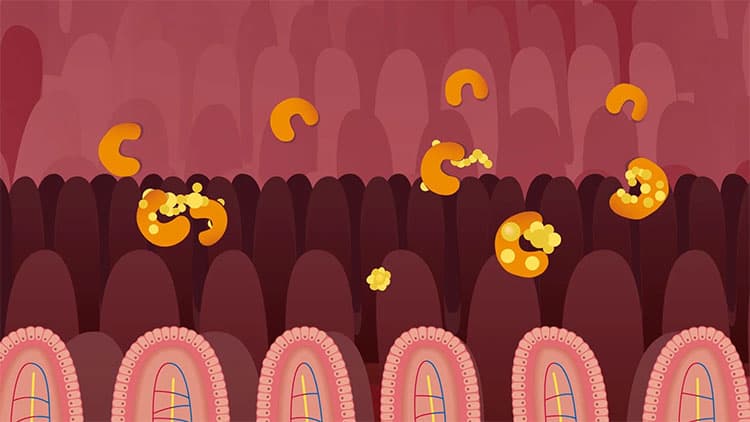How GluteGuard Works
GluteGuard’s patented enzyme, Caricain, is clinically proven to help protect against symptoms caused by accidental gluten ingestion

The Problem with Gluten
When gluten is consumed, the body’s digestive enzymes (pepsin, trypsin, chymotrypsin and others), which are found in the gastrointestinal tract, are unable to fully digest gluten proteins and some smaller undigested pieces of the gluten called ‘peptides’ remain.
Most people are not affected by these peptides. For others with recognised gluten-related disorders, these undigested peptides interact with intestinal lining, causing a cascade of events that leads to symptoms, inflammation and the associated autoimmune response that leads to intestinal damage.


GluteGuard's Innovative Natural Enzyme - Caricain
How GluteGuard Works – When taken before a meal, GluteGuard’s enteric coating ensures quick delivery to the small intestine where its Caricain enzymes are released. The enzymes target and breakdown the gluten peptides into harmless fragments, which then follow through the normal digestive process without causing symptoms or immune activation.
Scientifically Supported
GluteGuard was extensively researched and developed in-vitro, and later studied in randomised placebo controlled clinical trials. These explored GluteGuard’s efficacy in people with gluten related disorders and demonstrated that it was successful at protecting participants against the symptoms and related effects caused by a daily gluten challenge**.
In other words, our research has shown that GluteGuard works in the real world for real people.

Based on decades of scientific research
GluteGuard is the culmination of decades of Australian clinical and scientific research. Early work by Professor Hugh Cornell illustrating the biochemical composition of gluten, has been instrumental to the understanding of gluten’s toxicity in gluten related disorders.
As a former Professor of Biological Chemistry at the RMIT University, Professor Hugh Cornell OAM and Dr. Teodor Stelmasiak , hypothesised that if the right enzyme, of either plant or animal origin, is delivered to the gastrointestinal tract prior to the consumption of foods, it could complete the digestion of the toxic and immunogenic gluten peptides ultimately protecting patients against the effects caused by inadvertent gluten ingestion.
This work led to the discovery that Caricain, an enzyme extracted from the papaya fruit, was highly effective at breaking down gluten’s toxic and immunogenic peptides. This became the catalyst for the establishment of Glutagen Pty Ltd in 2001 and the subsequent development of GluteGuard.
GluteGuard was extensively evaluated in randomised placebo controlled clinical trials exploring the effect of caricain supplementation on symptoms and biomarkers of gluten related conditions. These trials demonstrated that GluteGuard was successful at protecting participants against the effects of a daily gluten challenge**.
For healthcare professionals enquiring about GluteGuard’s clinical research please visit:
**Cornell JH et al. 2016 IJCD Vol. 4, No: 2 p:40-47, Zebrowska A et al. 2014 – IJCD Vol 2, No 2 p:58-63. Clinical studies funded by Glutagen Pty Ltd.
GluteGuard helps reduce the occurrence of symptoms of medically-diagnosed gluten sensitivity caused by inadvertent gluten ingestion.


